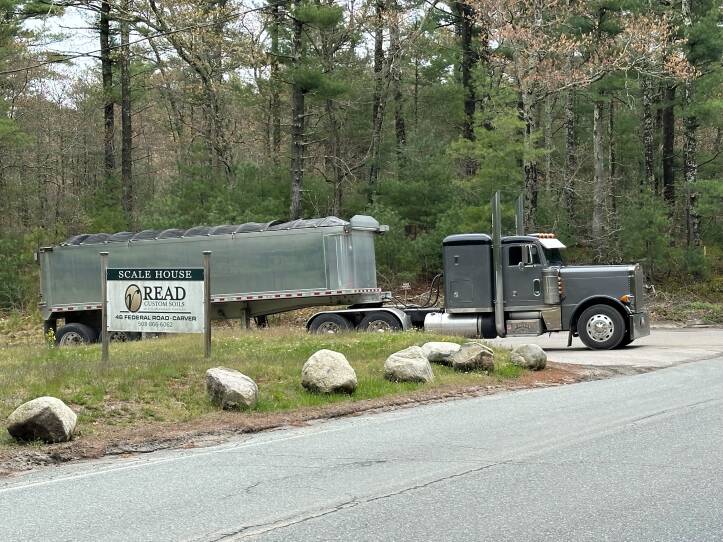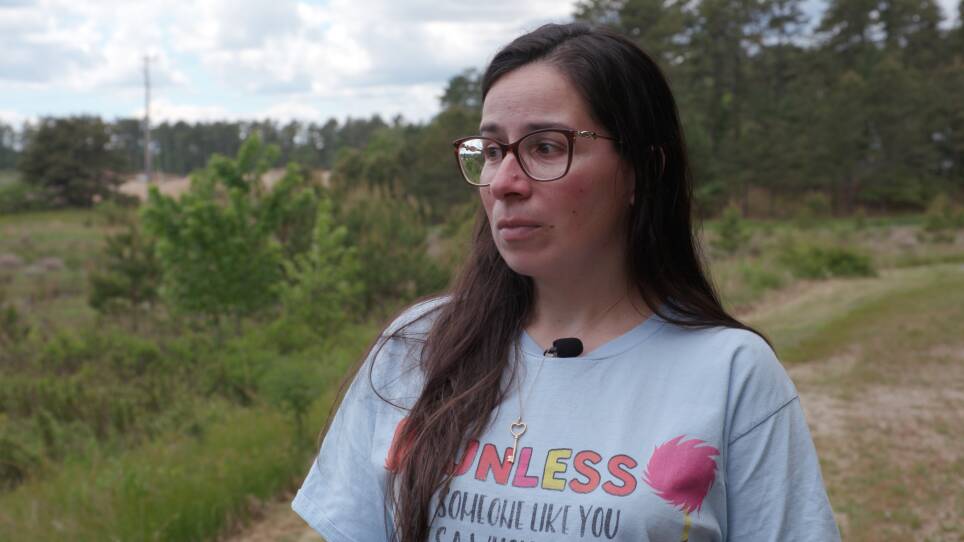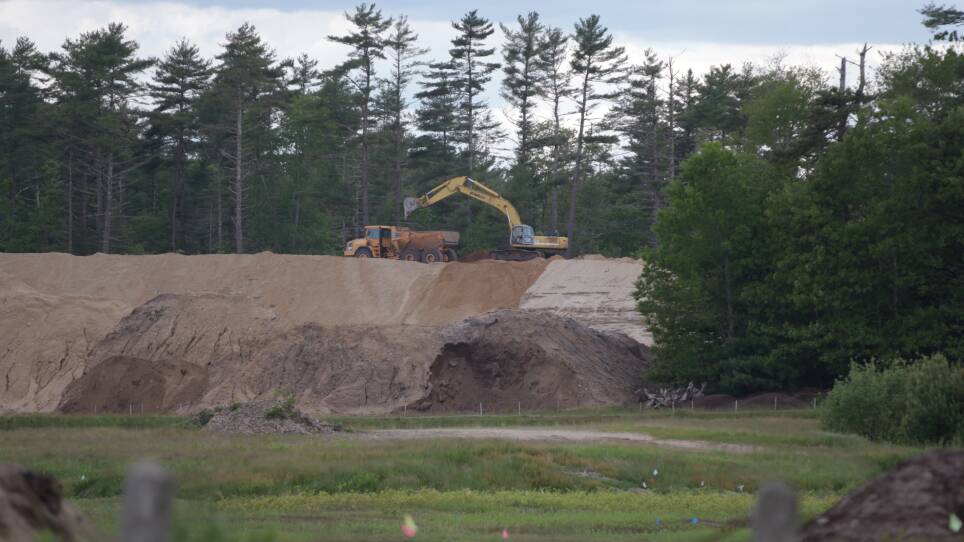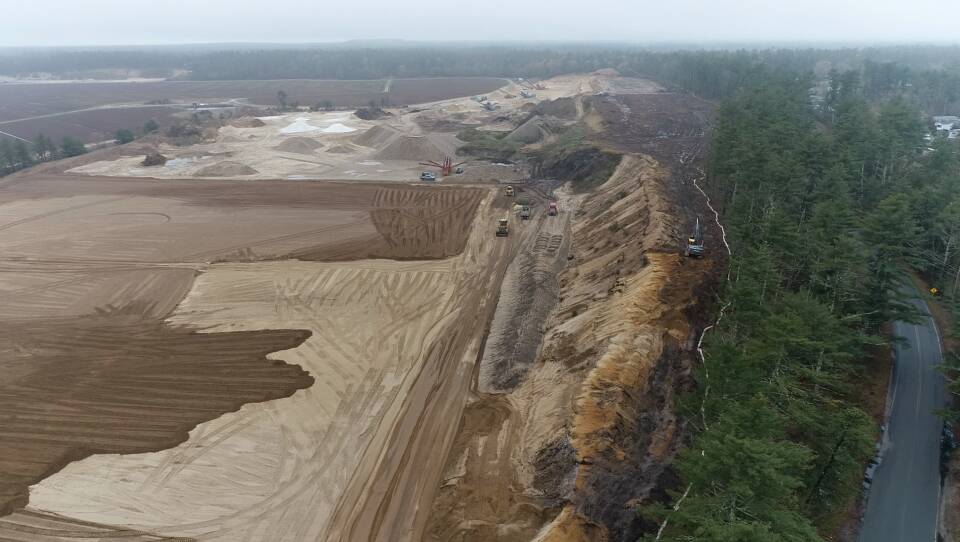Standing by the side of a road in Carver, attorney Meg Sheehan peered through some trees and pointed at an excavator at work. The property is owned by the largest cranberry grower in the world: a local company named A.D. Makepeace.
“So, right behind me is what’s called their Wankinco Bog — large cranberry bog, about 500-plus acres surrounded previously by upland forests,” Sheehan said. “But today, it’s at the heart of their sand and gravel mining operations.”
The site at 46 Federal Road is zoned for agricultural use. Digging is legally permitted as an agricultural project, to expand the footprint of the cranberry bog, as well as to create a pond to capture runoff.
A.D. Makepeace has been digging at the Wankinco bog for over a decade, and there are still no cranberries planted. All the while, it’s been allowed to haul up to 50 trucks of sand away each day. Sheehan says agriculture is just a cover for the far more lucrative business of removing the sand to sell it: the company sells sand for golf courses and construction projects through a subsidiary.
It’s an issue that’s raised tensions in recent years between some cranberry growers and their residential neighbors in Southeastern Massachusetts. The farmers have legal permits from local boards to remove sand from their properties as part of ongoing agricultural projects. But some residents complain the practice is damaging to the environment, and they say the scope of the sand removal equals an industrial mining operation that goes above and beyond what’s necessary for agricultural purposes.
A.D. Makepeace isn’t the only company doing this kind of sand removal in Southeastern Massachusetts.
“We have documented through our research report that over 2,000 acres has been strip mined over the last 20 to 30 years,” Sheehan said.
A.D. Makepeace makes money selling the sand through another company it owns called Read Custom Soils. That company advertises on its website , “We literally have millions of cubic yards of sand reserves that guarantee a consistent source for the foreseeable future.”
A.D. Makepeace declined to comment for this story.
Community opposition
Some residents have continually opposed the sand removal project, from fears that the town’s aquifer is becoming more vulnerable to pollution, to the dozens of trucks that drive down the winding road nearby, to the years of construction noise.

Jen Bogart moved to a home across the street in 2011.
“We could usually only hear birds and the occasional car,” Bogart said. “And now we hear construction. And it’s been that way for — solid construction — probably for the last eight years.”
A.D. Makepeace keeps changing when they say they’ll be done with the digging, Bogart said.
“We just want the truth. Just be honest,” she said. “I would rather them come out and say, ‘We’re not putting in bogs. This is what you’re going to have for the rest of your time here.’ OK, fine. If that’s what we have, we’ll get used to it. But they keep saying, ‘We’re going to be done, we’re going to be done, we’re going to be done’ — and they’re not done.”
Opponents say sand mining could be harmful to the local water supply. Most Carver residents get water from private wells.
Sand filters out contaminants before surface water reaches the underground aquifer, explained Scott Horsely, a hydrologist hired by the local coalition opposed to mining, as well as by other towns in the region looking into the impact of sand mining.
“The more you excavate down, the more you expose the groundwater to vulnerability,” Horsely said.

The legal question
Efforts to halt the sand removal through the courts and local boards have all failed.
The permitting for this kind of work is handled by a town committee, and it’s supposed to be temporary.
“They have used the same plans since 2011, resubmitting them three times over because the permits can only last for five years,” Sheehan said. Each time, a town committee has approved them.
Opponents say the sand extraction is an industrial activity masquerading as agriculture, and they brought their case to the town’s Zoning Board of Appeals, claiming that such work is outside the scope of what’s permitted in an area zoned for agriculture. The board’s chair, Stephen Gray, pointed out a similar complaint was filed back in 2021.
“Why are we still talking about this today?” he asked at the hearing.
Gray pressed the A.D. Makepeace attorneys on why the issue persists, pointing out that residents are “up in arms about what’s happening in their neighborhood.”
“And maybe some of it is fair, maybe some of it is unfair. I’m not making any judgments,” Gray said. “What I am saying is you guys need to talk and you need to talk soon,” as he gestured to both sides in the room.
“[These lawsuits have] been all thrown out. Just because someone says something with passion doesn’t necessarily mean that it’s right.”Brian Wick, executive director of Massachusetts Cranberries
The company’s attorney, Michael Crossen, defended A.D. Makepeace to the zoning board.
“It is a company that is working hard and employing many people and doing the best that it can within the law, and does work within the law, always,” Crossen said. “It is critically important to them that they abide by the law, and they believe that they are stewards of the land that they own.”
Ultimately, the zoning board found no violation and once again ruled in favor of A.D. Makepeace.
Brian Wick represents local growers as the head of an industry group called Massachusetts Cranberries.
“Lawsuit after lawsuit have been filed. They’ve been all thrown out,” Wick said. “Just because someone says something with passion doesn’t necessarily mean that it’s right.”
Still, Wick said most cranberry growers are not removing and selling sand. In fact, most need to buy sand for their cranberries to grow in.
“We have a very few amount of growers who also do some sand excavation as part of their business, but that’s a separate part from what most cranberry growers are doing,” Wick said. “We’re talking a very small percentage.”
Those growers that are digging, he said, are doing it for agricultural purposes, which is legally permitted.
“If you’re putting in a tail water recovery pond, for example, or putting in a new cranberry bog, that’s still agriculture. You’re removing the sand as part of that process,” he said. “But the end result is going to be [agriculture], and that’s what we support at the association is [agriculture] focused projects.”

State consideration
The Community Land and Water Coalition has ongoing litigation against several cranberry companies and others who are permitted to remove sand from their properties. But as they haven’t been successful in courts, they showed up this summer at the State House asking for a moratorium on sand mining and an evaluation by the state of the impacts of the practice.
A spokesperson for the Executive Office of Energy and Environmental Affairs says the office is aware of advocates’ concerns about the environmental impacts of sand mining — but that they haven’t found any violations of the law.
“We met with the advocates last year to address these concerns, and we are committed to conducting a further review of the potential impacts associated with sand mining and addressing specific complaints about environmental regulations,” the statement reads.
Among the organizations on the State House steps speaking out against sand mining was the Massachusetts Sierra Club.
“A lot of this regulation is at the municipal level so the protection is spotty. You get some here, you don’t get some here,” Art Desloges of the Massachusetts Sierra Club said at the State House. “We believe the state should take an overriding view of the whole thing and holistically say ‘What is better for all of the commonwealth?’”





